Erik Vendt talks to Slowtwitch
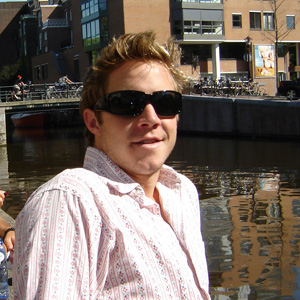
Erik Vendt already won 2 swimming silver medals in the previous 2 Olympic games and is currently getting ready to qualify for Beijing. Just recently he swam 14:47:59 in the 1500 m freestyle and appears to be in prime shape. He talked to Slowtwitch.
ST: Erik, can you tell us at what age you started swimming and if you did any other sports as a child?
Erik: I learned how to swim very young, at the age of three. Though I didn't start to actually compete until much 'later', when I was seven. I grew up in Saudi Arabia because of my Dad's job. And one of the few things to do there, in the American Compound where I lived, was swimming. When I came back to the States, I did what most American kids did; played football and baseball. I also joined a local club team to pursue my swimming passion further. I actually played baseball up until I was 13, at which point I felt like I had to make a decision between the two sports to focus all of my time and effort on it. Obviously, I chose swimming and the rest is history.
ST: The Olympics are coming towards us with giant steps. Can you describe your goals and build-up for Beijing?
Erik: I would say I have two sets of goals: one for the Olympic Trials and one for the Olympic games. In swimming here in America we have an extremely hard qualification process. It's one and done, basically if you don't place top 2 on the specific day at trials then all your dreams, all your hard work and all your efforts have been wasted because you'll be watching the Olympics from home instead of competing. Which is why it's vital not overlooking the initial and most important step of the process. So, for trials my goals are simple: make the team. Once I have that taken care of, then I can set my sights for Beijing and there my goals will be to win, plain and simple. I've been to two previous Olympics, winning Silver both times. And though I'm extremely happy with those accomplishments so far, another Silver is not what I'm shooting for.
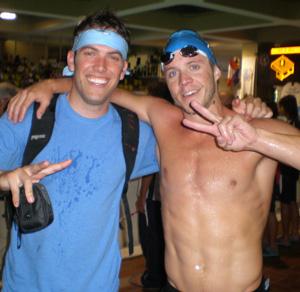
ST: Just a short while ago you swam 14:47:59 in the 1500 m freestyle, and that is the sixth fastest time of all-time. It appears that your form is great.
Erik: I feel like I'm in the best shape of my life; I've put in more consistent training at a much higher level over a longer period of time than I've ever been able to. I've always considered myself to be one of the hardest workers in the world; it was a sense of pride for me. But lately, I've been able to reach a new level in training, a new tier, that I had previously thought impossible. Times that I could never dream of doing in practice before (in repeats, sprints, endurance based sets, etc.) are a common occurrence now. I think another reason for my body being in such great shape has been the advent of Sunday workouts. I haven't taken a day off, Sunday or otherwise, all year. And I don't plan on being out of the water for more than a day until after Beijing.
ST: What else is on your schedule in terms of racing for 2008?
Erik: We have a couple warm up meets leading up to Trials, all are part of the USA Swimming Grand Prix circuit: Ohio State Grand Prix (April 4th-6th), Santa Clara International (May 15th-18th) and the Omaha Grand Prix which is a tune up meet for the pool we'll be using for Olympic Trials.
ST: During the season, what workload do you have during a typical week?
Erik: During the heaviest part of training we do upwards of 80K a week, with 3 weight sessions and 3 dryland sessions a week. Though that's extremely difficult on the body, I feel what we do at altitude training camp in Colorado Springs is far more difficult. We've done this 3 times since I've been here, and will have one more go at it at the end of April for 25 days. We go from sea level to 7,000ft and our schedule is as follows: triple, triple, double, triple, triple, double, single (Repeat that three times for three weeks at altitude and that’s our camp. Also, you have to add in one dryland or weight session per day so in reality we're doing quadruple workouts. Though our yardage isn't as high as we do at sea level our intensity is much, much greater. And it makes for a pretty tough few weeks. Though it's extremely challenging for the body and especially the mind, I feel I haven't done anything more beneficial than this.
ST: Would you also be so kind and describe a typical hard workout?
Erik: One of the sets we do quite a lot of is 10 300's; descend one to three and hold. Long course the intervals would normally be on the 3:30 and short course they would be on 3:15. Basically by number 3 you're going threshold pace, and if you do it correctly you shouldn't have too much energy left for the last one.
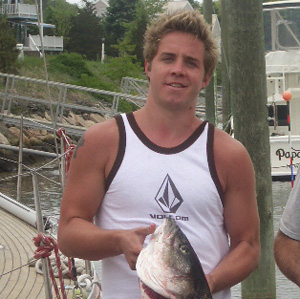
ST: What race result do you cherish the most and why?
Erik: When I look back on my race history there's so many races that give me Goosebumps. But my favorite is clear: it's the 1500 from 2000 Olympic trials. I became the first American to break the 15-minute barrier. It's something I had dreamt about for so long, so to finally accomplish it was literally a dream come true.
ST: Do you actually have a favorite pool/aquatic facility, or is it all the same to you?
Erik: A pool is a pool. But at the same time, there are some facilities that will always hold a special place in my heart. Indy and Sydney come to mind right off the bat.
ST: Do you have much of an off-season at all, and if so, what do you do during that time?
Erik: Swimming is a year round sport. We get about a week off in August and that’s it. It's taxing, no doubt about it. But it's something I've gotten used to over the years, so it doesn’t have too much of an effect on my now. But during that week off, I do whatever it is I can't normally do. So I try to sleep in as much as possible and be as lazy as possible!
ST: What is going on for you in terms of sponsorship and endorsements?
Erik: Right now, all I have is my swimsuit contract with Speedo and a deal with Coaches Oats, an oatmeal company. Swimming is one of those sports that you're obviously not in for the money. But I'm always out looking, and trying, for new deals to make day-to-day life a little easier.
ST: Do you do any cross training such as cycling and running?
Erik: During the beginning part of the season we'll run. But as the season progresses we normally get enough cardio in the pool, so our time outside of it is spent trying to build muscle and get stronger.
ST: What do you think about the success in triathlon of fellow Wolverine swimmer Andy Potts?
Erik: I think it's amazing, and also very inspiring. Andy was a great swimmer, and he was always a good runner as well. But he never had a serious background in triathlons, and now look at him. He's on of the best in the world. He's really made a name for himself in that sport. And it shows what a person, who is dedicated enough, confident enough and competitive enough can do.
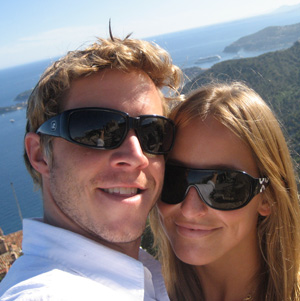
ST: Can you share with us some of your food likes and dislikes?
Erik: I love food. To me there's nothing better than a great dinner with great company. I love it all; Mexican, Italian, Chinese, Sushi, Indian, Cuban, Moroccan and being from Boston I love my seafood too. My favorite though, is Italian. I hate fast food with a passion, though I must admit, living in LA for 6 years, I have a soft spot for In'n Out.
ST: What about music? What do you listen to?
Erik: I like all kinds of music, if one was to look through my ipod they'd see a wide array of music ranging from Hip Hop to Rock. My favorite is Hip-Hop, but not the kind of Hip-Hop you hear on the radio, I’m not a fan of that stuff. I like more underground stuff, with more substance, more rhymes and less beats.
ST: What is the last book you read?
Erik: It was called "2012: The Return of Quetzalcoatl." It's a little bit out there, but extremely interesting nonetheless. The basis of the book was the end date of the Mayan Calendar.
ST: Where do you see yourself in 5 years?
Erik: I see myself fresh of a great traveling experience, one that brought me to the farthest corners of the World. I want to see all of South America, India, Africa and South East Asia. Traveling is definitely one of my passions, and this trip I've been planning (which will commence as soon as I'm done swimming) will be one for the ages. I have high hopes for it and I think it'll reach every expectation. As soon as I'm done with that, I'll get settled for a bit, start a swim school (which is another one of me goals), try to make it as successful as possible and have some fun with it. As to where I'll be located, I'm still not sure. I feel sometimes like I'm a bit of a nomad, I always need a change of scenery. So what I'll be doing is much easier for me to answer than where I'll be.
ST: Is there anything else we should know about you?
Erik: I think we covered most of it!
Erik Vendt on his way to break a meet record in the 800m freestyle



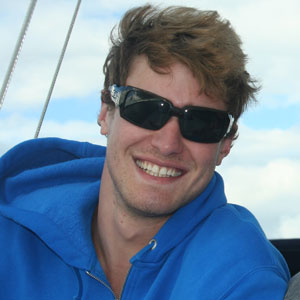
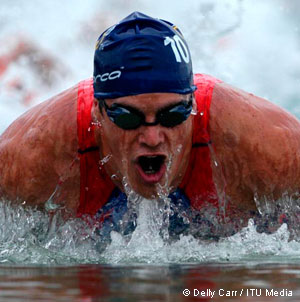
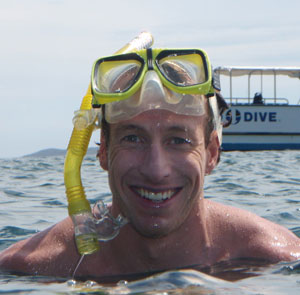
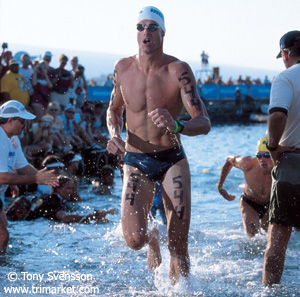

Start the discussion at forum.slowtwitch.com